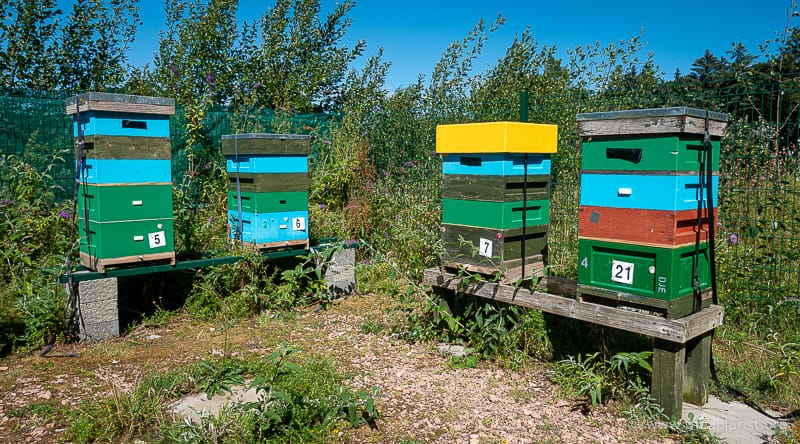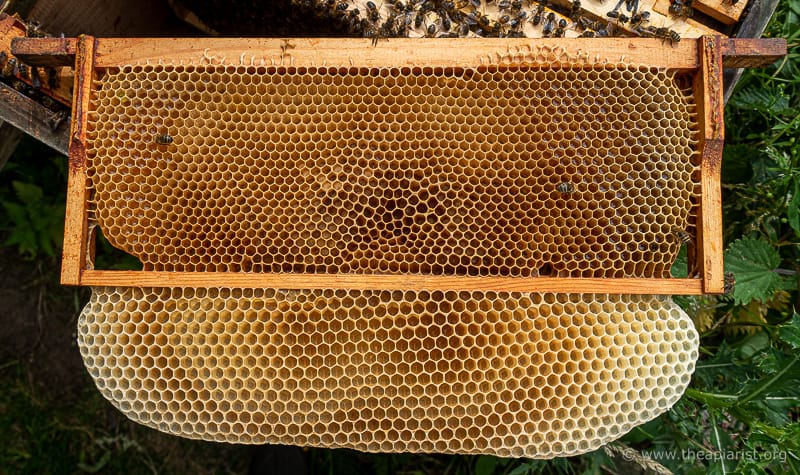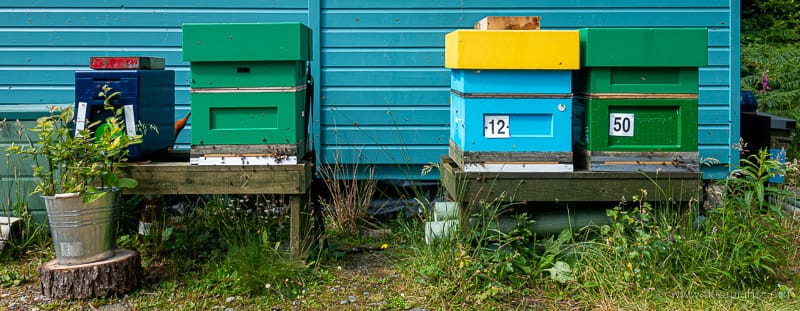The Apiarist in 2022
Synopsis : A review of the year on The Apiarist; top of the posts, weirdo searches, clickbait titles and coffee. Don’t expect anything erudite. Happy New Year!
Introduction
And another year ends.
After 51 posts, ~160,000 words, 999 comments and ~62,000 spam ‘adverts’ for fake sunglasses, casinos, ivermectin {{1}} and goodness-only-knows-what (in Russian) later, this is the last post of the 2022.
Assuming this appears before midnight on the 30th I’ll have {{2}} managed to meet my self-imposed deadline of posting every Friday afternoon this year. This is my annual review of what happened on the website during the year, which were the most popular posts, where did visitors come from or go to etc.
Overall, the ~510 posts on the site were read ~20,000 more times than last year. This is a fractional increase over last year, despite the fact that readers increased by ~7.5%. I assume this might be due to the articles being longer (and therefore more self-contained {{3}} ), though there may be other reasons to do with changes I’ve made to the server that runs the site (and the accuracy with which I count ‘real’ visitors).
The first posts on The Apiarist – on Paynes poly nucs and clearer boards – were made in 2013, so this year marks the end of a decade of writing.
During the last year, what have visitors been reading?
Top of the Posts
Like all the best award ceremonies {{4}} I’ll go through the top 10 in reverse order.
The following posts, together with generic ‘landing’ pages like www.theapiarist.org and www.theapiarist.org/blog account for about one third of all the posts read during the year. With the exception of the two indicated, all were published before 2022.
10 – Swarm prevention
Why colonies swarm and the mechanics of swarming … and some suggestions on how swarming can be delayed or prevented. The fact that the majority of more popular posts were on swarm control suggests this article might need rewriting 🙁 .
9 – Queen cells … quantity and quality
How many ’charged’ queen cells should you leave in a colony when applying swarm control – or after a colony has swarmed – to prevent the loss of (further) swarms. The answer, as you well know, is one.
8 – The nucleus method
My favoured swarm control method. Performed properly – which isn’t difficult – it is 100% effective in preventing swarming and uses a minimum of additional equipment. For the last 2-3 years this is the only method of swarm control I’ve used, and it has been totally successful. I don’t know why associations continue to promote Pagden’s artificial swarm when this approach is easier to both understand and apply … and uses less boxes.
7 – Pagden’s artificial swarm
As taught in many beekeeping associations. Usually accompanied with a Tommy Cooper-like commentary resembling the ’glass, bottle, bottle, glass’ sketch (YouTube) … but with less laughter (or applause). Interestingly, Pagden started as a skeppist and the original protocol he developed was for use after a colony had swarmed {{5}}.
6 – Vertical splits and making increase
An alternative swarm control method that – like the nucleus method above – uses relatively little additional equipment. It can result in more lifting and the stack of boxes can be rather cumbersome and/or heavy. Very useful in an overcrowded apiary or if you plan to merge the colony back together and not make increase though 😉 .
5 – The ultimate hive stand? (2022)
I usually try and avoid the clickbait-type titles for posts … you know sort of thing; ’Beekeepers warned to avoid this common procedure’ or ’Make £50,000 a year from your bees’. Or the instantly memorable, but non-beekeeping ’You’re a single celled organism. Can you evolve into a duck?’ You’ll also not find posts on ’The 10 best hive tools’, or similar. I don’t own 10 different sorts of hive tools so am not qualified to make the comparison. However, I made an exception and included the superlative ultimate in this title, resulting in thousands of views since July (and a huge increase in advertising revenue {{6}} ). It’s also a pretty good hive stand.
4 – Demaree swarm control
Another eponymous swarm control method that is more popular with readers than it is with me. I prefer not to have drone brood emerging above a queen excluder and find it less reliable than the nucleus method (above). It’s also more difficult to manage midseason mite management (during a Demaree) should it be needed. Like the Pagden method, the current implementation differs from the original description by G.W. Demaree.
3 – Winter covers and colony survival (2022)
A surprise third place (to me at least) … and one that generated a lot of comments. Although the paper the post was based on left more unanswered questions than PMQ’s it was clearly of widespread interest and something I’ll return to in the future.
2 – Mad honey
I now live on the remote west coast of Scotland surrounded by rhododendron-infested oak and birch woodlands. The native bumble bees forage on the rhodos with abandon, but I don’t think I’ve ever seen a honey bee on them. Which, considering the paresthesia-inducing grayanotoxin the nectar contains, is perhaps fortunate. However, a ’stoned’ Turkish bear cub {{7}} in mid-August triggered a tsunami of visits to this post, coupled with offers of – and requests for – honey.
1 – Queen cells … don’t panic
And the winner is … an article on what to do when you find queen cells during a routine colony inspection, including specific instructions on not panicking. This was also the most read post in 2020 and ’21. 50% of all visits to this site come from search engines (Google, Bing etc.), the majority of which ‘hide’ the search terms entered … I like to think many of the visits to this page come from a search for ’Aargh! Queen cells, I’m panicking!’
What does this ‘top ten’ tell me?
Seven of the top ten posts are about swarming, its prevention or control. This is not because the majority of the posts on this site are about swarm prevention or control. Instead I think that this is an aspect of beekeeping that many people – I assume particularly beginners – struggle with.
However, whilst swarming might result in the loss of a swarm {{8}}, it rarely results in the loss of the complete colony.
It feels like a disaster, but isn’t.
In contrast, poor management of Varroa will regularly result in the loss of the colony, but it’s not until the 14th most popular post this year that the first post on mite control appears.
I suspect this reflects a couple of things:
- swarm control is needed during the summer months (May – July) when readership of this site is the highest. There are about 2-3 times the number of readers in June as December.
- there’s something more ‘immediate’ about the need for swarm control, whereas many beekeepers think that miticide treatments – as long as they’re applied sometime – are less time-sensitive. I’m not at all convinced that this is correct; swarm control is clearly time-sensitive, but I’d argue that winter mite treatment with oxalic acid can be almost as time-critical.
And – since you asked – the least popular post was a 2017 article on the need (or otherwise) for midsummer colony inspections which attracted an underwhelming total of just 9 viewers 🙁 .
I think all this really tells me is that the search facility is used rather infrequently … and the indexing is not as good as it could be.
Where from and where to?
About 50% of readers reach the site from Google searches which account for ~90% of all the search engine traffic that leads here. I’ve stopped bothering looking through the search terms (other than for this annual post) as they’re generally a combination of obvious beekeeping terms (swarm, queenright, Varroa) and glaring typos (swam, denaree, fundationless).
However, now and again there are searches that could make for entertaining future posts:
- how to calculate items in a jar {{9}}
- what colour are queen cells {{10}}
- コンタクトキラー 柔術 {{11}}
- little drama {{12}}
- have flour water honey salt what can i make {{13}}
- profit per hive beekeeping {{14}}
Readers leave the site via the outgoing links I embed in the posts. Of these, links to the equipment supplier E.H. Thorne’s were the most commonly clicked (perhaps I should ask for a lucrative sponsorship deal? {{15}} ), with Wikipedia a close second. I’m a big fan of Wikipedia, particularly for recent cultural references, and donate to support it.
Thorne’s and Wikipedia were followed by the Welsh BKA (for articles by Wally Shaw), the National Bee Unit and Dave Cushman’s website (now maintained by Roger Patterson), though these three lagged well behind the first two.
Behind the scenes
The site is self-hosted on a virtual machine in the cloud.
I’ve no idea what that means either 😉 .
However I do know that it involves a reasonable amount of maintenance to ensure the site is secure, that the firewall lets bona fide visitors in whilst excluding ‘script kiddies’ and the majority of bots, and that software is kept updated to minimise vulnerabilities.
All this takes more time that I would like and, because of my limited abilities, a lot more time than it should.
However, it also gives me a bit more control over things. After a major site upgrade in September I now want to introduce a few more changes over the next few months.
Comments
The commenting system is, frankly, a bit primitive. It’s the one that comes packaged with the software that runs the site, but it lacks certain features I think would be beneficial. I’ve tested a number of alternatives and hope to switch to another system soon. It should make comment approvals (for me) easier and will facilitate better threaded comments, and ‘upvoting’ helpful comments. For the terminally shy it should also allow anonymous commenting, with certain provisos.
I’d like to thank everyone who took the time to comment on posts this season. These help clarify errors I’ve made, or suggest alternative interpretations or conclusions.
Social media
New posts to this site appear on Friday afternoons (at the moment … goodness knows what’ll happen in the future). They are automagically announced on Facebook and Twitter.
Or were … 🙁 .
This ‘free’ feature of the software that runs the site will very soon become a ‘premium’ feature for which they’ll try and charge me over £100 a year extra. It’s this sort of ‘feature creep’ (the wrong term, but I can’t think of the right one at the moment {{16}} ) that takes either time or money to fix.
I don’t have much of either.
Of the two, Facebook generates a bit more traffic. However, I’m not a Facebook user and I find it an abomination to use interactively. Therefore … if you rely on Facebook for new post announcements then please consider signing up for email announcements instead. The Facebook linking may well disappear altogether.
You might have noticed that Twitter is a little chaotic these days. Adverts and hate speech are increasing on a daily basis and it’s becoming a much less pleasant environment. I barely use it, and I get the impression that others are using it less. Follower numbers are all over the place and it’s less ‘fun’.
At the current rate Twitter may well go bankrupt before I decide to stop posting new post announcements there. In the meantime, those of you who have switched to Mastodon can find me at https://mastodon.scot/@theapiarist. I will endeavour to make new post announcements to Mastadon and Instagram (the latter is a relatively new account, but is altogether better than either Facebook – who own it – or Twitter).
Newsletter
There isn’t one.
But I would like to replace the current email system (and possibly some of the social media stuff listed above) with an emailed newsletter. If so it will be ‘opt in’ and you’ll need to sign up separately for it.
Watch this space.
Coffee
The ~160,000 words of beekeeping wisdom verbiage this year were generally written late at night, aided by an unhealthily large – but nevertheless deliciously invigorating – number of cappuccino’s and flat white’s. I think the latest I stopped was 3:15 am, a time unreachable without copious quantities of coffee.
I’m therefore very grateful to supporters who ’Bought me a coffee’ in 2022, and particularly grateful to those of you who are repeat supporters.
This support not only stops me slumping semi-conscious over the keyboard in the wee hours of the morning, snoring stentorianly, but also helps offset the costs of the server and the associated software needed to run the site {{17}}.
Thank you 🙂 .
Even Buy Me a Coffee has suffered from ‘feature creep’ in 2022 and stopped taking Paypal payments. I know this caused some supporters a problem. If you’d like to support The Apiarist but want to use Paypal you can now do so via Ko-fi {{18}}.
Praise and abuse
Someone presumably not on the supporters list is ‘RG’ {{19}} who posted a comment on April 1st:
Who are you??? What is your connection to the bee world.? Are you a credible writer and have the expertise to make statements about bees and bee able to back it up? Are you an expert bee person? Where do you get the information you post?
I receive a lot of similar sounding generic comments which usually contain links to other websites i.e. adverts of one form or another. I therefore assumed it was one of these or an ‘April Fool’, albeit not a particularly good one, and banned RG.
However, I also did a little research and discovered a beefarmer of the same (unusual) name in Iowa. I’ve no idea if it was one and the same person. Whether he was or wasn’t, he ensured the ban was permanent by sending me an even less polite follow-up email.
Fortunately, the majority of the communications I receive – in comments on individual posts, direct emails or accompanying coffee contributions – are very much more supportive and appreciative.
Thank you again for this support. It goes a long way to offsetting the few negative comments from RG and the like.
The Apiarist is retiring
Actually, The Apiarist has retired.
I always thought that 32 was too early to retire {{20}}, but it’s going great so far 🙂 .
Whilst I still have bees on the east coast of Scotland, that’s unlikely to continue much beyond the start of the 2024 beekeeping season. I now live permanently on the remote west coast and have other plans and priorities.
These other plans and priorities (obviously) include a significant amount of beekeeping. However, not exclusively … assuming the weather is better than the shocker we had this year I’ll be doing more walking, cycling, sailing, canoeing, birdwatching, photography and (a lot more) lounging around looking at the view.
I’ll also be doing more writing, though not more here.
Three thousand word posts are probably too long for the majority of readers. The average this year is about 3,100 words. The tens of thousands who read Queen cells … don’t panic – a mere 1500 words long – were probably looking for a quick answer.
I’ve found X … what must I do next?
They don’t have time to learn about why they’ve found X, what the colony was doing before X appeared, or what it would normally do next with X.
Despite the fact that knowing these things would almost certainly help them know exactly what to do when X appeared 😉 .
Conversely, 3,000 words is too few to do the really big and important topics in beekeeping justice.
Environmental competition, climate change, neonicotinoids, fake honey, treatment-free strategies and lots of the science would benefit from more in-depth coverage. Even some of the more ‘anecdoty’ (that isn’t a word, but should be … OED tells me that anecdotal would be better) posts would benefit from more space.
I’m looking at alternatives.
Coming next
If there are topics I’ve not covered, but should, then email me with suggestions. I’ve written almost 800,000 words on beekeeping since 2013 so do a quick search first to check it’s not already been covered.
I’m not keen to simply rehash stuff that’s already written. There are only so many ways that you can describe Pagden’s artificial swarm and it gets boring just shuffling the words into a slightly different order.
However, remember that I’ll only cover topics I feel qualified (and competent) to write about, so you won’t find much here about candlemaking or mead. I’ve done both, and although I might be qualified I’m a long way from competent.
But … I can’t promise I’ll write a post on any particular topic … at all, or any time soon {{21}}. I need to know something about the topic and be interested in it. Both of these (particularly the first) are major limitations.
Much of the reward of writing these posts is furthering my own knowledge of the honey bee and beekeeping topics that fascinate me. That’s why I’ve written several posts recently on larval selection for queen rearing; it’s clear that the ways the bees do it and the way beekeepers do it are fundamentally different.
Is this relevant to beekeeping and queen rearing?
Possibly … I don’t yet know enough.
A new beekeeping year
I’m writing this is the dying days of 2022, a year which will be notable (in the UK) for political chaos {{22}}, the end of Covid {{23}} and climate change; we started with storms Eunice, Dudley and Franklin and ended it being the warmest year on record {{24}}.
As I discuss in my talk on Planning for the season ahead, at a first approximation it’s reasonable to expect that next year will be much the same as this year, or the average of the last few years, at least when considering the weather.
You’ve therefore got a pretty good idea what to expect and when to expect it.
Now is the time to start making your preparations … and perhaps your resolutions for the season ahead.
Whatever 2023 brings, may your supers be heavy, your queens fecund, your bees well-tempered and your swarms … from someone else 😉
Happy New Year
{{1}}: Clearly Covid hasn’t gone away … probably because of the reliance on ivermectin.
{{2}}: Miraculously.
{{3}}: Necessitating reference to fewer pages … though perhaps they are just less readable.
{{4}}: Differing only in the absence of an actual award.
{{5}}: He may also have been a first class cricketer.
{{6}}: Not.
{{7}}: Not a phrase I ever expected to use on this site.
{{8}}: It doesn’t need to – see the (much less popular!) posts on queen clipping or bait hives.
{{9}}: Your guess is as good as mine as to how this led here …
{{10}}: One for April Fool’s day perhaps?
{{11}}: Which appears to translate to ’Contact Killer Jiu Jitsu’.
{{12}}: Most of mine are major dramas.
{{13}}: Sourdough?
{{14}}: Profit? Dream on!
{{15}}: I’ll not mention that only 0.25% of page reads resulted in a visit to the Thorne’s website.
{{16}}: Robbery?
{{17}}: There’s no advertising, despite some of the quips, and I’d like to keep it that way.
{{18}}: And thank you in advance if you do.
{{19}}: Anonymised to protect the guilty.
{{20}}: Ahem!
{{21}}: I’ve got a list of about 60 things in my drafts folder already.
{{22}}: It’s not over yet.
{{23}}: It’s not over yet.
{{24}}: And, like political upheaval and the end of Covid – you’ve guessed it – climate change is also ‘not over yet’.







Join the discussion ...